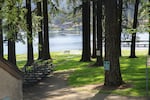The Oregon Supreme Court will hear arguments Friday morning in a case challenging limits on who can access Lake Oswego's eponymous lake.
The city has been sued, arguing it’s violating long-established Oregon law.
Despite the water being public, the city prohibits access to the lake from adjoining public parks. Put another way: the city's rules don't allow people to get into the lake from public parks that touch the lake.
The basis for the case is whether the city can create rules for its own parks, even if they limit access to the lake from public land. The court's ruling could have wide-ranging implications for access to public waterways across the state.
“As I understand it, we don’t have a place where there’s a park with public access to the lake," said Scott Lazenby, the city manager for Lake Oswego.
As he talked, Lazenby was sitting on wide concrete stairs that lead into a part of the lake called Lakewood Bay. Small metal signs set along the last dry step read: “Private Lake – Please stay on the steps.”

Small metal signs adorn steps leading down to Oswego Lake's shore in a public park read: “Private Lake – Please stay on the steps.” Access to Oswego Lake is restricted to city residents only.
Conrad Wilson / OPB
He said there are many ways for the general public to enjoy the lake, such as looking at it from the park or restaurants along the shoreline.
“You can enjoy it from a distance," Lazenby said.
In 2012, Todd Prager, an open water swimmer and Mark Kramer, a kayaker, filed a lawsuit challenging the city’s rules. They argued that under Oregon law, all navigable waterways are public and must be accessible from public land. To prevent that, they argued, would set a dangerous precedent.
They've lost twice in court. In 2014, a Clackamas County Judge ruled in favor of the city. In May 2017, the Oregon Court of Appeals issued an opinion upholding that ruling. Last fall, the state's highest court agreed to review the case.
Lazenby said it’s important for any city to be able to make rules that govern municipal parks.

Scott Lazenby, Lake Oswego's city manager, said the city has to have the ability to make its own park rules.
Conrad Wilson / OPB
"I think that’s the essence of the case," he said. "I can tell you that as my five years as city manager, the city council has never had a discussion on the policy merits of lake access ... It really hasn't come to the surface, frankly, as a burning issue."
Access to Oswego Lake is limited to city residents.
The city of roughly 40,000 people is 89 percent white and the median home value is just under $650,000.
There's a city-owned swim park for residents. Other access is restricted to members of the Lake Oswego Corporation, a nonprofit made up of the roughly 3,500 homeowners who live around and near the lake.
The corporation is in the middle of a major construction project rebuilding its boat garage and office. The work includes a laboratory for its full-time limnologist, who studies the lake’s biology. A big concern is keeping algae in check, especially as the lake warms up in late summer.
“The Lake Oswego Corporation was created to manage the lake," said Jeff Ward, general manager of the Lake Corp., as it is known.

The Lake Grove Swim Park on Oswego Lake is operated by the school board and only accessible to certain homeowners.
Conrad Wilson / OPB
The corporation was formed in 1942 when Oregon Iron and Steel Company transitioned to a real estate development firm. The Lake Corp. has filed as an intervenor-defendant in the case before the Oregon Supreme Court in support of the city.
Ward said that if the city fails, the ruling would hurt Lake Corp members.

Jeff Ward is the general manager of the Lake Oswego Corporation. The nonprofit has filed as an intervenor defendant in support of the city. If the city loses, he said it could hurt Lake Corp. members.
Conrad Wilson / OPB
ldquo;You have folks who don’t know the rules and regulations and things like that," Ward said.
When asked if those were the main reasons it is in the Lake Corporation’s best interest to keep people off the lake, Ward said:
“I don’t think it’s to keep people off the lake," he said. "But I think it’s to control access to the folks that have deeded access to the lake. That’s what we were created for.”
The two plaintiffs, Prager and Kramer, either declined to be interviewed or couldn’t be reached for comment.
Karl Anuta, a Portland attorney who wrote a friend of the court brief on behalf of the Northwest Association of Steelheaders, said it’s fine for the city to make park rules. But, he said, the rules have to apply to everyone equally. What the city has effectively done, he argues, is create a residency requirement for lake access, which divides the public.
"That kind of classification, whether it's based on race, age or some other category, is not OK," Anuta said. "It's not OK from a policy perspective, and legally it restricts some members of the public from access to a public waterway but not others."
Beyond that, Anuta said Lake Oswego's rules set a dangerous precedent other cities could follow.

Karl Anuta, a Portland attorney who wrote a friend of the court brief on behalf of the Northwest Association of Steelheaders, said it’s fine for Lake Oswego to make park rules, but he says the rules have to apply to everyone equally.
Conrad Wilson / OPB
“If the City of Lake Oswego can put residency or corporation members as a restriction to access on public waters through public parks, then there’s nothing to prevent other municipalities like the city of Maupin on the Deschutes River," Anuta said. "Or what if the city of Salem did that to the Willamette River? What if the city of Grants Pass did that to the Rogue River?"
In his brief, Anuta points to a 1959 opinion by Oregon’s then-attorney general that said the “Lake Oswego Corporation can enact no rules and regulations governing the public use of boats on Oswego Lake.”
In the case now before the state Supreme Court, the Oregon Department of Justice argues they have no duty to provide public access.
That’s drawn the ire of some.
“It’s very disappointing that the state has been so passive in this whole affair," said Michael Blumm, a professor at Lewis & Clark Law School in Portland. He’s also filed an amicus brief on behalf of the plaintiffs; it's signed by 60 law professors from across the country.
“The state basically has supported the city and not the public’s right to access a public resource from public lands," Blumm said.
The Oregon Department of Justice doesn’t comment on pending litigation but points out in its brief that there’s no duty on the part of the state to require access.

The Lake Grove Swim Park on Oswego Lake. The city of roughly 40,000 is 89 percent white. The median home value is just under $650,000.
Conrad Wilson / OPB
Back along Lake Oswego, the birds are chirping. A family of ducks quack.
Here in a public park, just touching the water can result in a $150 fine. Despite that, city officials said they’ve never actually cited anyone for violating the rules.

